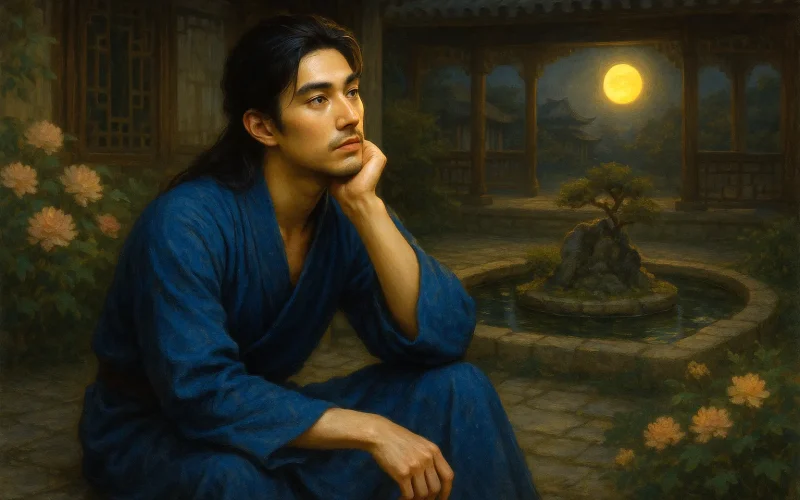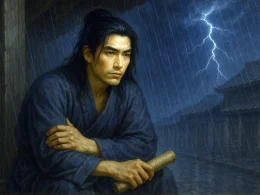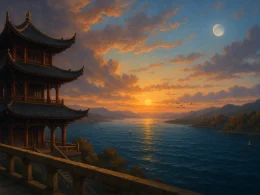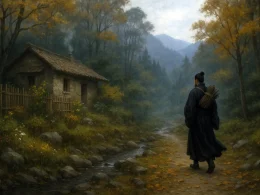"The sun has set, and a mist is in the flowers;
And the moon grows very white and people sad and sleepless.
A Chao harp has j ust been laid mute on its phrenix-holder,
And a Shu l ute begins to sound its mandari n-duck strings .
Since nobody can bear to you the burden of my song,
Would that it might follow the spring wind to Yen-jan Mou ntain.
I think of you far away, beyond the blue sky,
And my eyes that once were sparkling
Are now a well of tears .
...Oh, if ever you should doubt this aching of my heart,
Here in my bright mirror come back and look at me!"
Original Poem
「长相思 · 其二」
李白
日色欲尽花含烟,月明如素愁不眠。
赵瑟初停凤凰柱,蜀琴欲奏鸳鸯弦。
此曲有意无人传,愿随春风寄燕然。
忆君迢迢隔青天。
昔日横波目,今作流泪泉。
不信妾断肠,归来看取明镜前。
Interpretation
This poem is the second in a series composed after Li Bai's dismissal from court by Emperor Xuanzong ("granted gold and sent away") and his departure from Chang'an in 744 CE. Like the first poem, it emerged from the poet's profound political disillusionment. Beneath the surface theme of a lovesick woman's longing pulses the poet's own deep frustration and endless hope following the collapse of his political aspirations.
First Couplet: "日色欲尽花含烟,月明如素愁不眠。"
Rì sè yù jìn huā hán yān, yuè míng rú sù chóu bù mián.
Sunlight fades, flowers veiled in mist's embrace; Moon bright as silk—sorrow denies sleep's grace.
This couplet connects dusk and moonlit night, creating temporal continuity that metaphorically represents the poet's daily disappointment and wandering. "Flowers veiled in mist" conveys bewilderment, while "moon bright as silk" suggests chill desolation—not merely a lovesick woman's view but Li Bai's own reflection on his bleak prospects and isolated situation.
Second Couplet: "赵瑟初停凤凰柱,蜀琴欲奏鸳鸯弦。"
Zhào sè chū tíng fènghuáng zhù, Shǔ qín yù zòu yuānyāng xián.
Zhao lute stilled, phoenix pillars grow cold; Shu zither awaits love-bird strings, untold.
The imagery of "phoenix" and "love-birds" (symbolizing conjugal harmony) can be interpreted politically as yearning for ideal ruler-subject rapport. The woman's "just stopped" and "about to play" vividly reflect Li Bai's own anxiety and inner conflict—his talents stifled, his mind restless.
Third Couplet: "此曲有意无人传,愿随春风寄燕然。忆君迢迢隔青天。"
Cǐ qǔ yǒu yì wú rén chuán, yuàn suí chūnfēng jì Yānrán. Yì jūn tiáotiáo gé qīngtiān.
This melody's meaning finds no messenger; I'd trust it to spring breeze towards Yanran. Remembering you, beyond blue skies so far.
Here "Yanran" superficially denotes the frontier but deeply symbolizes the political center—Chang'an. The "message无人传" represents Li Bai's unexpressed strategies and talents. "Trusting to spring breeze" is his naive fantasy, while "beyond blue skies so far" is cold reality, highlighting the insurmountable distance created by slander.
Fourth Couplet: "昔日横波目,今作流泪泉。不信妾断肠,归来看取明镜前。"
Xīrì héngbō mù, jīn zuò liúlèi quán. Bù xìn qiè duàncháng, guī lái kàn qǔ míngjìng qián.
Once your eyes shone like ripples clear; Now they've become fountains of tear. If you doubt my heart breaks in despair, Return, see my mirror-face, worn and bare.
This extreme contrast and desperate cry form the emotional climax. "Eyes like ripples" may symbolize Li Bai's confident, brilliant demeanor upon first entering Chang'an; "fountains of tear" and "heart breaks" externalize his pain after political frustration. The final plea embodies near-desperate hope that the ruler might witness his sincerity and suffering.
Holistic Appreciation
Written entirely from a female perspective, this poem exemplifies "men writing in women's voice." Using the lovesick woman's voice, Li Bai expresses the scholar's grief of "unrecognized talent." The emotion evolves from vague sorrow to anxious search, hopeless longing, and finally impassioned outcry—perfectly matching Li Bai's post-Chang'an mental journey. Every musical image, spatial barrier, and tear of longing serves as both emotional expression and political allegory, giving this delicate work profound conceptual depth.
Artistic Merits
- Skillful Use of Double-Entendre: Core images like "phoenix," "love-birds," "Yanran," and "you" (implied ruler) carry dual meanings, creating profound metaphorical space.
- Expressing Grand Ambitions Through Delicate Language: Using delicate romantic themes to wrap grand political aspirations creates powerful tension between content and form, producing unique artistic effect.
- Dramatic Emotional Expression: Through strong "past-present" contrast and direct confrontational appeal at the end, internal emotions are externalized into impactful dramatic scenes.
Insights
This poem profoundly reveals the individual's helplessness before the grand currents of political fate. It teaches us that the deepest pain often stems from the shattering of highest expectations. Whether in the waiting of love or the pursuit of ideals, the loneliness of "a message with no messenger to convey it" and the isolation of being "separated by vast blue skies" represent universal human dilemmas. Yet despite extreme despair, the poet maintains the persistence of "entrusting it to the spring breeze toward Yanran" and the hope of "return and see my face"—this capacity to preserve hope amid despair constitutes the most moving power in Li Bai's tragic spirit.
Poem translator
Kiang Kanghu
About the poet

Li Bai (李白), 701 - 762 A.D., whose ancestral home was in Gansu, was preceded by Li Guang, a general of the Han Dynasty. Tang poetry is one of the brightest constellations in the history of Chinese literature, and one of the brightest stars is Li Bai.












